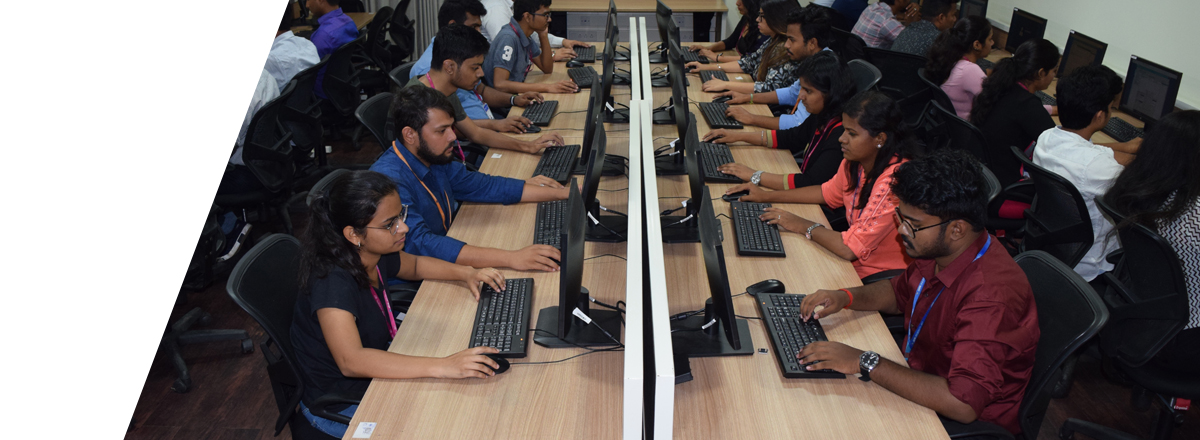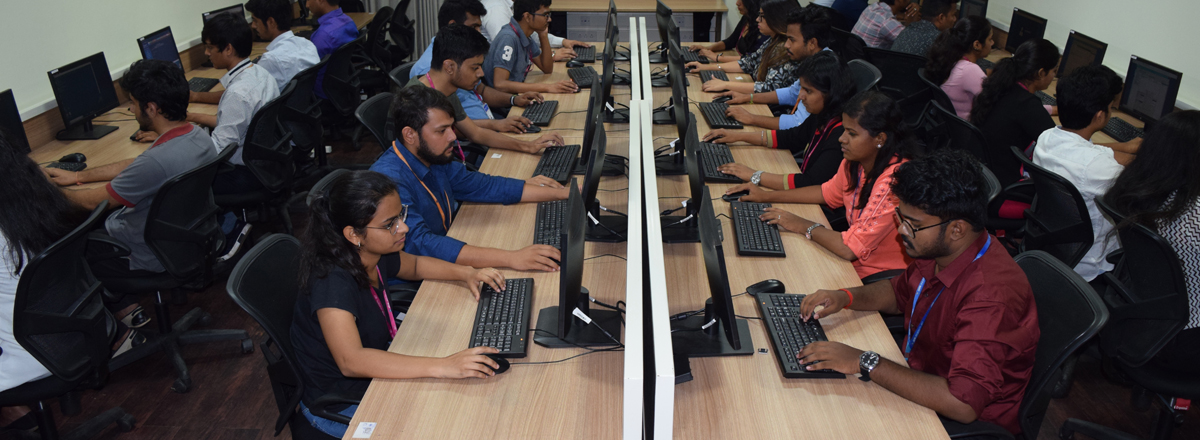Eligibility
- 45% minimum in 12th (40% for SC/ST) with Physics & Math (Chemistry/Electronics/CS/Bio optional).
- IB: 26 credits minimum.
- Cambridge: 3 A-Levels (Physics, Chemistry, Math).
- 12th appearing students and NIOS candidates eligible.
- Accepts UNIGAUGE/JEE/ComedK scores.
Study Campus
Faculty of Engineering & Technology
45th km, NH - 209, Jakkasandra Post
Bangalore - Kanakapura Main Road
Ramanagara District - 562 112
+91 80 2757 7198
+91 7337618222
Admissions Office
JAIN Knowledge Campus
# 44/4, District Fund Road
Jayanagar 9th Block Campus
Bangalore - 5600 69
+91 7337618222
080-46650130
About the program
The B. Tech programme in Computer Science and Engineering* at JAIN (Deemed-to-be University) one of the top computer science engineering colleges in Bangalore provides a thorough education in computing and technology, equipping students to succeed in the worldwide technology industry. Based on computational theory, the course includes algorithms, data structures, and programming languages, which develop important problem-solving skills for computer science. Moreover, students will acquire a deeper understanding of system design, AI, and software development, ensuring that they are well-prepared with the most up-to-date industry knowledge.
The programme places a strong emphasis on practical learning through projects and research, frequently working in partnership with industry partners. Obtaining industry certifications and completing internships offer hands-on experience, equipping graduates to effectively handle actual challenges in the workforce. Graduates are equipped with a combination of theoretical knowledge and hands-on expertise, empowering them to lead and drive technological advancements and societal change.
Why take this programme?
-
Opting for this Computer Science and Engineering* programme
opens the door to a world where technology is the driving force
of change. It provides a robust foundation in both the theoretical
underpinnings and practical applications of computing, setting the
stage for innovation and problem-solving in diverse industries.
-
This programme is particularly distinctive for its integration of AI
and state-of-the-art software practices, preparing students to excel
in a tech-driven future and become architects of the next wave of
digital transformation.
-
Learn Hands-on about various tools and technologies that are currently
trending in the market like ChatGPT, Prompt Engineering, GenerativeAI,
Competitive Coding and much more
-
Earn Certifications from global cloud partners such as Microsoft Azure and Google Cloud Platform
Program Specific Outcome
On completion of the CSE General program, students will possess the following program specific outcomes:
- PSO 1: Design and develop network, web-based, cloud-based computational systems.
- PSO 2: Design efficient algorithms, understand software practices and implement code with optimization.
Enhance your B.Tech experience with the option to pursue a Minor Degree from IIITH and gain unique opportunities for academic and professional growth!
Key Highlights of the UG Minor Degree Program from IIITH:
Certificate Issuance:
- Students will have the option to receive certificates from IIITH upon successful completion of each semester.
- These certificates will be issued in three parts over the course of the program, recognizing incremental progress.
Minor Degree Recognition:
- University has the discretion to award a minor degree to their students, utilizing the certificates issued by IIITH.
- This option allows students to earn additional credentials and enhance their academic profile.
Research Internships:
- Top performers in the Minor Program will be considered for research internships at IIITH.
- These internships provide an excellent opportunity for students to gain hands-on experience and deepen their expertise in their field of study.
Note:
- An additional cost is applicable for enrolling in the UG Minor Degree Program.
- To earn the minor degree, students must earn an additional 20 credits on top of their regular credits as part of the curriculum.
Program Matrix
This program is based on Choice Based Credit System (CBCS) in line with the recommendations of UGC. Students will have the opportunity to choose various courses offered under the program, which will comprise core (C), basic sciences (BS), humanities and social sciences (HSS), departmental electives (DE), Open electives (OE), and skill enhancement courses (SEC). Total credit points for this program will be 162.
|
|
BS
|
ES
|
HSS
|
Core
|
OE
|
SEC
|
MC
|
INT
|
DSE
|
Total Credits
|
|
SEM 1
|
11
|
5
|
4
|
-
|
-
|
-
|
-
|
-
|
-
|
20
|
|
SEM 2
|
3
|
8
|
2
|
5
|
-
|
3
|
-
|
-
|
-
|
21
|
|
SEM 3
|
-
|
-
|
2
|
14
|
-
|
-
|
-
|
-
|
-
|
19
|
|
SEM 4
|
-
|
2
|
-
|
12
|
-
|
3
|
-
|
4
|
-
|
21
|
|
SEM 5
|
2
|
-
|
4
|
6
|
6
|
-
|
-
|
-
|
3
|
19
|
|
SEM 6
|
2
|
-
|
-
|
6
|
3
|
3
|
-
|
4
|
6
|
24
|
|
SEM 7
|
-
|
-
|
2
|
6
|
3
|
3
|
-
|
-
|
6
|
22
|
|
SEM 8
|
-
|
-
|
-
|
7
|
-
|
-
|
-
|
6
|
3
|
16
|
|
Total
|
21
|
15
|
14
|
56
|
12
|
12
|
0
|
14
|
18
|
162
|
Abbreviations
|
|
1
|
BS - Basic Science
|
|
2
|
ES - Engineering Science
|
|
3
|
HSS - Humanity and Social Science
|
|
4
|
Core - Program Core Course
|
|
5
|
DSE - Department Specific Elective
|
|
6
|
OE - Open Elective
|
|
7
|
MC - Mandatory Course
|
|
8
|
SEC - Skill Enhancement Course
|
|
9
|
INT - Internship
|
Credit Distribution Table
- BS
- ES
- HSS
- Core
- OE
- SEC
- MC
- Intern
- DSE
Duration of the program: 4 years
Curriculum
- Calculus and Matrix Algebra
- Applied Chemistry
- Mind Management and Human values - 1
- Computer Aided Engineering Drawing
- Engineering Physics
- Communicative English
- Biology for Engineers
- Electrical and Electronics for computational thinking
- Project Centric Learning
- Problem Solving Techniques
- Computer Organization and Architecture
- Probability and Vector Space
- Mind Management and Human Values – 2
- Programming practices using Java
- Python Programming
- Project – 1
- Data Structures
- Discrete Mathematics and Graph Theory
- Operating Systems
- Data Communication and Networks
- Indian Constitution
- Foundations of Mathematics – 1+
- Design and Analysis of Algorithms
- Theory of Computation
- Database Management Systems
- Project Centric Learning
- Foundations of Cloud Computing
- Compiler Design
- Web Technologies
- Software Engineering
- Cryptography and network security
- Foundations of Mathematics– 2+
- Project – 2
- Internship -1
- Linux administration
- Open Elective – 1
- Business Communication & Storytelling
- Research Methodology
- Artificial Intelligence
- Department Specific Elective – 1
- Open Elective – 2
- Project Centric Learning
- Machine Learning
- Department Specific Elective – 2
- Environmental Studies
- Department Specific Elective – 3
- Advanced Computer Networks
- Open Elective – 3
- Project – 3
- Internship - 2
- Essentials of Software Quality Assurance
- Department Specific Elective – 4
- Introduction to Internet of Things
- Intellectual Property Rights
- Economics for Engineers
- Department Specific Elective – 5
- Open Elective – 4
- Project - 4
- Cyber Security Fundamentals
- Department Specific Elective – 6
- Computer Graphics and multimedia
- Research *
Department Specific Electives
|
DSE Tracks
|
Elective-I
|
Elective-II
|
Elective-III
|
Elective – IV
|
Elective – V
|
Elective – VI
|
|
5th Semester
|
6th Semester
|
6th Semester
|
7th semester
|
7th Semester
|
8th Semester
|
|
Track-I
|
FULL STACK DEVELOPER
|
Backend Programming
|
Server-Side Scripting
|
Data modeling with NOSQL Database
|
RestAPIs using Spring Boot Framework
|
Front end Framework using Angular and React
|
DevOps
|
|
Track-II
|
DATA ENGINEERING
|
Data modeling with NOSQL Database
|
Data warehousing and data mining
|
Big Data Analytics
|
Data Analytics using SQL
|
Data Visualization using Tableau
|
Database Security
|
|
Track-III
|
BLOCKCHAIN
|
Mathematics of Modern Cryptography
|
Introduction to Block chain Technologies
|
Cryptocurrency Technologies
|
Smart Contracts
|
Blockchain for Cyber Security
|
Blockchain Technology in Web Development
|
Computer Science and Engineering (Open Elective Baskets)
|
|
Sl. No
|
Finance and Accounting
|
Entrepreneurship and new venture creation
|
Marketing and Management
|
|
1
|
Finance for non-finance professionals
|
Entrepreneurship Theory and Practice
|
Marketing Management
|
|
2
|
Wealth Management
|
Launching and managing an enterprise
|
Consumer Behavior
|
|
3
|
Indian Financial System
|
Business Plan and Project Implementation
|
Brand Management
|
|
4
|
Financial Reporting
|
Sustainable Entrepreneurship
|
Product Management
|
- Software Developer
- Systems Analyst
- Machine Learning Engineer
- Data Scientist
- Network Security Engineer
- Cloud Computing Specialist
- Full Stack Developer
- DevOps Engineer
Some highlights of the CSE programme include:
- Through examination of fundamental computer science principles, combined with practical experience in advanced programming languages, data structures, and algorithms.
- Integrating software engineering abilities with hands-on problem-solving opportunities through capstone projects, incorporating industry-specific tools and technologies such as ChatGPT, Prompt Engineering, and GenerativeAI.
- An immersive learning environment at Futurense with 12-month internships, along with certifications from Futurense and global cloud partners like Microsoft Azure and Google Cloud Platform, will help build confidence in your skills.
- Comprehensive career development offering over 100 online courses in partnership with global organisations, with a focus on cutting-edge technology, programming, tech leadership, project and product management, as well as ongoing assistance in soft skills, professional communication, and opportunities for research and innovation.
- GenerativeAI/Prompt Engineering Certification from a Global Tech Leader
- A Cloud Certification either from Google Cloud Platform/Microsoft Azure
- Futurense Certifications in Python Programming, Data Visualisation & Storytelling, Prompt Engineering, Design Thinking & Tech Leadership
Note
- The university will cover the cost of global certification (only for two certifications) and it is limited to one attempt. If students fail to complete the first certification, the university will not cover the cost of the second certification attempt.
- If the certification industry changes the name of the certification, the university reserves the right to modify the name of the certification accordingly.
- The university retains the authority to adjust the certification name it offers to industry trends.
Students are provided with a structured learning path integrated with contributions from the following organisations. This approach facilitates a holistic comprehension of diverse facets within the field, empowering students to cultivate specialised skills and knowledge as they progress through their academic journey.
- Amazon
- Microsoft
- Google
- Udemy




